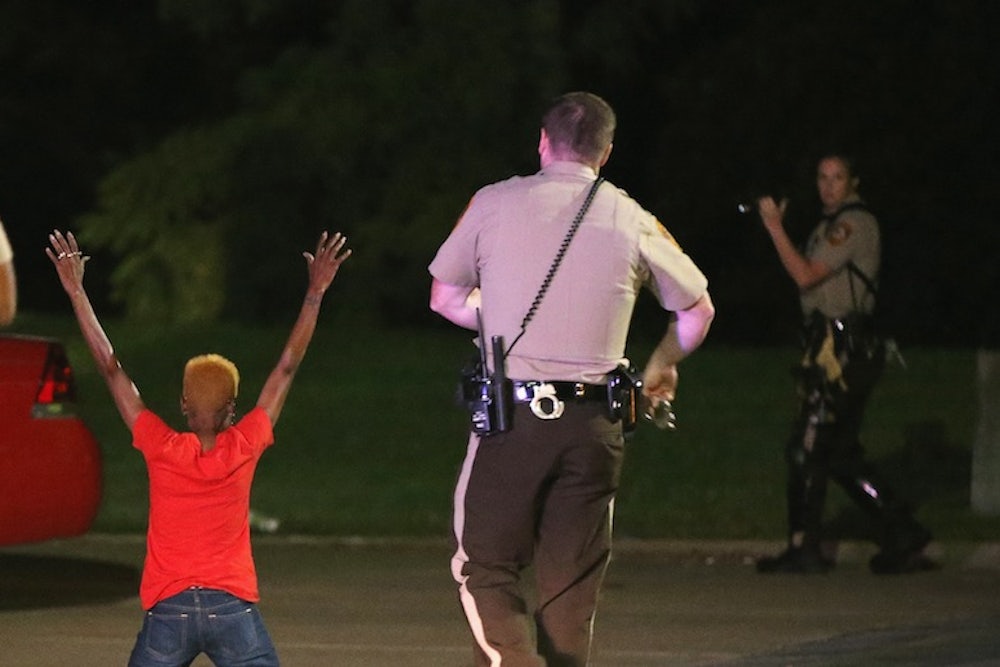There were more protests in Ferguson, Missouri, on Wednesday night. There were also more confrontations with police and more arrests—and many more questions about what the heck is going on there, four days after the shooting of an unarmed young African-American man by a local officer.
Among the people that police took into custody on Wednesday were two reporters: Wesley Lowery of the Washington Post and Ryan Reilly of the Huffington Post. It happened while they were at a McDonald’s that journalists have been using as a makeshift base to cover the demonstrations. According to Lowery’s account, which you can read here, police in assault gear came into the McDonald’s and asked people to leave. Lowery was arrested after trying to videotape the officers, as he was gathering his things and walking out. Reilly was arrested at the same time, for reasons that remain unclear. Both reporters said they were handled roughly. Both were released a few hours later. “We are appalled by the conduct of the police officers involved,” Washington Post Executive Editor Martin Baron said in a statement.
The journalists will be ok, I suspect, and the free press will be, too. Ferguson’s police chief told another journalist that the arresting officers were “probably somebody who didn’t know better”—an explanation that seems plausible. But as several other writers observed last night, the incident calls into question the credibility of officials who say the police response to the protests—a reaction that has included extensive use of tear gas and rubber bullets—is necessary to maintain public safety and order.
To be clear, there are still a lot of unanswered questions about what’s going on in Ferguson—and what went on before. The photographs of highly militarized cops standing off against apparently peaceful protesters look very bad. So do the stories of rough treatment, worse than what the two reporters got. But there was looting a few days ago, plus reports of at least a few protesters lobbing “flaming projectiles” at the cops as recently as last night. Similarly, the details of what actually happened on Saturday remain very much in dispute. Everybody seems to agree that Michael Brown, 18, didn’t have a weapon and was shot multiple times from one gun. But the police say all of this happened after Brown attacked an officer and tried to grab the officer’s firearm. Witnesses say Brown was shot while in the act of surrendering, after being stopped for nothing more than walking in the middle of the street. Right now, there’s just no way to be sure about these things.
Still, a few things are clear. One is that African-Americans make up 63 percent of Ferguson’s population, but account for 86 percent of all traffic stops and 92 percent of all arrests. Another is that the Ferguson police force, like the local government, is nearly all white. Police officers are public servants in the truest sense of the word. They put their lives at risk, in order to keep the rest of us safe. They are also human beings, flawed and prone to bad judgment at moments of great stress. That’s precisely why it’s important for police to maintain the trust of the communities they serve. Such trust clearly does not exist in Ferguson. That’s a big problem—and not just in the suburbs of St. Louis.
—Jonathan Cohn
Other news from Wednesday:
CLIMATE: Long Island had record rainfall this week. Yes, scientists link worse downpours to climate change. (ABC News)
ENERGY: How is that transition to low-carbon energy sources going? The U.S. is awash in coal imports while domestic oil production just hit a 27-year high. (Wall Street Journal, Reuters)
RIGHT-WING NOISE MACHINE: First Fox News pundit Keith Ablow suggested Michelle Obama was overweight. Now he’s saying she dislikes America. (Politico)
Stories worth reading:
Most important policy story of the day: Jodi Kantor on how unpredictable work schedules undermine good parenting and family stability for low-income workers (New York Times)
Yes, contraception coverage matters: Tara Culp-Ressler describes some new data. It shows that public clinics aren’t keeping up with rising demand for birth control from low-income people who struggle to pay for it on their own. (ThinkProgress)
For this, they have the money? Molly Redden reports that several states, including Texas, are continuing to pay a controversial, widely “discredited” expert to help them defend anti-abortion laws in court. (Mother Jones)
Stories we’ll be watching today.
Ferguson, plus any more signs of how the Administration is preparing for Obama’s coming executive action on immigration.
At QED:
More on Ferguson: Rebecca Leber points out that the police forces of most cities are predominantly white, way out of proportion to the percentage of whites in their population. Elsewhere at the New Republic, Jason Zengerle wonders why it takes incidents like the shooting of Michael Brown to make people pay attention to racial profiling, something that’s been happening for a long time.
